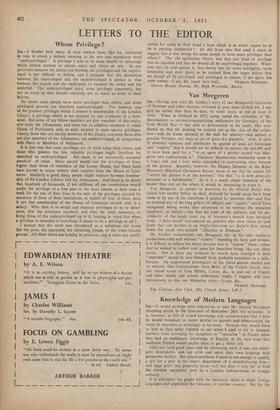LETTERS TO THE EDITOR
Whose Privilege?
sut,—I wonder how many of your readers have, like me, attempted in vain to attach a definite meaning to the new and mysterious word "underprivileged." A privilege I take to be some benefit or advantage which certain persons or classes enjoy and others do not. In any particular instance the distinction between the privileged and the unprivi- leged is not difficult to follow, and I presume that the distinction between the unprivileged and the underprivileged is similar to that between the unpaid and the underpaid, or between the unfed and the underfed. The underprivileged enjoy some privileges apparently, but not as many as they should—certainly not so many as some of their fellows.
No doubt some people have more privileges than others, and some
privileged persons are therefore underprivileged. For instance, one of the greatest privileges which I possess is membership of the London Library, a privilege which is not enjoyed by one Londoner in a thou- sand. But some of my fellow members are also members of that exclu- sive body the Athenaeum, and some 'are in addition members of either House of Parliament, and, as such, entitled to quite special privileges. Clearly those who are merely members of the library, and even those who are also members of the Athenaeum, are underprivileged, in comparison with Peers or Members of Parliament.
It is also true that some privileges are of more value than others, and those who possess the less valuable Privileges might therefore be described as underprivileged. But there is. no universally accepted standard of value. Many people would rate the privileges of Peers higher than those of members of the Lower House, but Peers, have been known to resent bitterly their transfer from the House of Com- mons. Similarly a good many people might hesitate between member- ship of the London Library and the Athenaeum. And there is no doubt that hundreds of thousands, if not millions, of our countrymen would prefer the privilege of a free pass to the local cinema at least once a week for the rest of their lives to the sum of the privileges enjoyed by members of three of these institutions, or indeed all four of them, were It not that membership of the House of Commons carried with it a salary. Who then is to weigh and measure privileges so as to deter- mine, first the minimum standard, and then the steps necessary to bring those of the underprivileged up to it, bearing in mind that when a privilege is extended to everybody it ceases to be a privilege at all ?
I suspect that the word was introduced as a substitute for terms like the poor, the oppressed, the labouring classes, or the lower-income groups. All these terms are lacking in precision, and is there any justifi- cation for using in their stead a term which is so much vaguer as to be in practice indefinable? Or did those who first used it mean to suggest that it was wrong for some people to have more privileges than others ? The old egalitarian theory was that any kind of privilege was an injustice and that we should all be unprivileged together. What- ever may be said against it, that theory was far more intelligible, more defensible and more likely to be realised than the vague notion that we should all be privileged, and privileged to almost, if not quite, the





















































 Previous page
Previous page